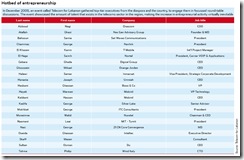
“When you are in a position of leadership in an international company, it is very interesting, yet you are surrounded by the organisation,” Atallah explains. “You give a lot in a specific area, but it’s hard to expand your capability and be able to give as an individual in more areas. The personal challenge for me came in by saying, “I am successful in doing this in a large organisation, I have all the support around me with a big name,” but I wanted to take the challenge and say maybe there is an opportunity for me to do something without a big name.”
What Atallah went on to create is a company called NexGen Advisory Group, which offers advisory and consultancy services in a specific domain. The company is a niche player offering the link between business and technology, having identified the offer of these kinds of services as a gap in the market.
“There are people who either offer high level strategy advice or those providing very technical advice. The gap in-between is that a company either has a strategy but it has no means to execute, or it has a very technical consultancy approach, but doesn’t necessarily know what to do with this,” Atallah says. “So the gap in-between is how does a company take these two and bridge them together and come up with a well-balanced business strategy with a technology architecture, and make sure that whatever the company devises as a business strategy is actually executable?”
NexGen launched in October 2006, and Atallah remembers how difficult it was to sign the first deal. The company has three target segments: Telecom operators; real estate developers; and governments; and in these areas offers a similar approach when talking about the use of technology in order to drive practical applications. NexGen only targets large enterprises, and thus as an initially unknown quantity, found itself competing with the leading advisory and consultancy companies for work. Atallah recalls that a strong sense of will and confidence in what the company offered helped see it through in the early days.
“I’ll tell you it really tested our will to want to do this. It took us about six months to land our first solid contract, but we stayed true to only targeting the A-list of customers,” Atallah says. Having made that first break through, NexGen spent the next two years confirming its niche appeal, and Atallah is flabbergasted by the company’s progress to date.
“In this short period of time in which we have been doing business; we have achieved quite a lot. We have managed to establish ourselves as the authority in our space and have become well known. We have very large companies that are our customers.
NexGen has done business with the likes of Dubai Properties and Nakheel in the UAE; and has also concluded deals outside the country, including in Qatar with Barwar Real Estate, and Qatar Diar, which are two of the largest developers in Qatar. NexGen has also done work for sizeable real estate companies in Saudi Arabia, and continues to do business across the region.
“If we look at the telecoms service providers, we have Etisalat and Du as customers. We are negotiating with Omantel and Qtel. We have discussions with Mobily and STC and we are right in there with these guys, talking to the right level of people in terms of the offering what we have,” Atallah says. NexGen has also done worth with governments, such as the government of Dubai, advising on how the deployment and use of next generation digital services could make a city more efficient.
NexGen has a team of over 20 professionals at this stage and looking to the next two-and-a-half years, aims to grow this number to nearer 50. What Atallah is clear on, however, is that he would not like the company to grow too large for fear of its losing that entrepreneurial flavour that has helped its successfully identify and implement strategies thatrespond to
market opportunities.
 “When we consider what we want our five-year milestone to incorporate, we would want to be running a larger organisation. We did decide on setting up an operation in Dubai as well as Beirut, and we have established those. Beirut will be our centre of expertise and talent. We also decided on setting up an operation in Saudi Arabia, which we are in the process of doing,” Atallah reveals. “At five years old we’ll want to be around 50 people, which is a very good size organisation to be able to continue to do what we are doing.”
“When we consider what we want our five-year milestone to incorporate, we would want to be running a larger organisation. We did decide on setting up an operation in Dubai as well as Beirut, and we have established those. Beirut will be our centre of expertise and talent. We also decided on setting up an operation in Saudi Arabia, which we are in the process of doing,” Atallah reveals. “At five years old we’ll want to be around 50 people, which is a very good size organisation to be able to continue to do what we are doing.”
Atallah is also attracted to the outsourced or managed services business model, in which NexGen would be able to help establish and run a technology business unit within a large enterprise before handing it back for the organisation itself to continue operating. As for the future of NexGen, Atallah believes all options remain open to its ultimate development with respect to perhaps IPOing the company at a later stage; acquisitions, or NexGen being the target of an acquisition. “We have the freedom as a leadership team, and are actually devising our next business ventures, which are quite interesting. We see more gaps in the market and we already have two ideas in place,” Atallah says.
On a personal note, Atallah says the rhythm of his working day has been inverted from the time he was at Cisco. He suggests that in large companies, much of the day is spent internally focussed, conducting internal meetings, attending to emails, and the conclusion of other administrative functions. Only a portion of the day is spent outwardfocussed, considering external developments and liaising with customers.
“This becomes exactly the opposite in a smaller organisation. You can spend a lot more time focussed outwards towards customers and strategy. So one can spend a lot more time on the creative side rather than the internal reporting side,” Atallah suggests.
While the global economic downturn has had a negative impact on the provision of advisory services, Atallah views this period in a positive light, believing organisations with genuinely value-adding propositions will survive and become stronger. So he views this downturn in the global economy in general and real estate sector as a good opportunity, believing that during the boom time companies could throw almost anything out there and would be able to work because there was so much opportunity and business.
“Now I think we are in an appropriate downturn, I refer to it as a cleaning up phase. I think the strong that have a solid business model, team, experience and execute on that will succeed,” Atallah says. “We enjoy this kind of environment and I feel that now there is going to be a bit of cleaning up and shaking up. And when you shake it up, some fall, some stay, and some become stronger. We hope we are going to be in the last category and come out of this period with a strong market position, because I would like to think we have done our homework,” he adds.
Atallah attributes the early success of his company to a number of factors, including its offering, its approach to problem solving and the experience of the team. The approach NexGen initially put in place was to remain independent and not to sign up with an international firm and represent that foreign entity in the region. This was the last thing the company wanted to do, according to Atallah, and instead NexGen developed its own methodology and intellectual property, and spent some time in the early days developing a very thorough approach.
Experience also plays a role in that the team assembled at NexGen has actual hands-on experience in what it is advising on. The obvious changes Atallah has experienced in launching his venture is an expansion in freedom to do things he wants to and the ability to make choices. However, with those new found freedoms comes added responsibility, which Atallah consider to be another key difference with his time at Cisco.
“When you are in an international company, be it in a senior position or not, you still have your guidelines of what you can and what you cannot do,” Atallah says. “As soon as I left I felt (Cisco), a weight was lifted off my shoulders in the sense of giving me a lot of freedom to decide and think what could be done. But a lot of responsibility comes with the freedom as well, because at Cisco we had a direction, while in the case of going it alone, you set your own responsibility.
click image to enlarge






0 comments ↓
There are no comments yet...Kick things off by filling out the form below.
Leave a Comment